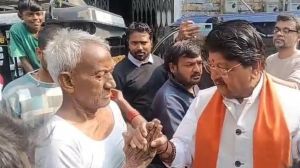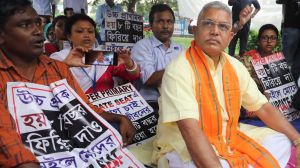The 50 per cent credo
Merit and affirmative action. Fundamental rights and the pursuit ofexcellence. Can the twain ever meet? Uttar Pradesh's minister for highe...

Merit and affirmative action. Fundamental rights and the pursuit ofexcellence. Can the twain ever meet? Uttar Pradesh8217;s minister for highereducation, Om Prakash Singh, has once again stirred up debate on theseemingly irreconcilable ideals that inform Indian policy-making. Singh hasdecreed that no student securing less than 50 per cent marks at thebachelor8217;s level shall secure admission for any post-graduate course in hisstate. If current trends are anything to go by, enrollment in post-graduateprogrammes will effectively be halved. This has predictably elicited howlsof protest, liberally sprinkled with charges that the fundamental rights ofstudents have been violated. That is only to be expected in times whenpopulism is sought to be elevated to high policy, with nary a care for themediocrity rut it traps the nation in. Accordingly, endeavours like Singh8217;swill no doubt be deemed elitist and bourgeois. That would be unfortunate.Indeed, this is just one of the many radical steps required to restore asemblance of excellence to Indian academia.
First, however, the tricky issue of fundamental rights. By imposingrestrictions based on merit, by refusing to offer highly subsidised highereducation to all aspirants, would the state be shirking its duty? What arethe limits to a university8217;s own right to turn away applicants? Exploringthe debate on whether medical education ought to be comprehensivelysubsidised by the state, sociologist Andre Beteille quotes renowned juristRichard Dworkin in the context of access to legal education in the US.quot;Individuals may have a right to equal treatment in elementary education,quot;Dworkin had argued, quot;because someone who is denied elementary education isunlikely to lead a useful life. But legal education is not so vital thateveryone has equal right to it.quot; It may be a different context; but as it iswith legal education in this example, so it is with post-graduateprogrammes. Invoking fundamental rights would thus be a politically correctexercise in obfuscation. Admittedly, one could debate the criteria invokedto limit access to post-graduate programmes. But any argument against theimposition of merit would be a damning comment on the goalposts India isaiming for in the 21st century.
It makes little sense to divert copious funds from what is undeniably thestate8217;s duty to provide a dozen or so years of quality learning to all itsyoung ones to thousands of students who have not attained even a minimallevel of excellence after years of subsidised tutoring. But even as UttarPradesh embarks on its new policy, even as it points to a course the rest ofthe country should consider, it must ensure that while seeking merit fromapplicants, it should also offer them an opportunity to take flight. Thisentails periodic revision of syllabi, raising faculty standards, andde-politicising the campuses to put an end to the trade unionist, andnon-classroom, activities that frighten away serious students. It would alsorequire a more rigorous evaluation procedure to shoo away the thousands ofstudents who use post-graduate courses as transit homes while they indulgein other endeavours.
- 01
- 02
- 03
- 04
- 05































